
Deception, Betrayal, and Karmic Doom
Karma is a crime thriller, yes. But more than that, it is a slow, merciless descent into the inescapable consequences of human greed, desperation, and revenge.Rather than following a singular, linear plotline, Karma constructs a mosaic of six intertwined lives, each thread weaving a tighter, more suffocating knot around the next. What begins as seemingly separate tragedies: crippling debt, an accidental killing, an unhealed past, gradually and methodically converges into something far darker than anyone could have anticipated.
At first, the show might give the impression of being an anthology, as each early episode focuses on different characters with narratives that appear self-contained. However, by the third episode, the true nature of the series emerges, the realization that these stories are not isolated events but rather fragments of a much larger and deeply interwoven nightmare.
Each character is more desperate than the last, and each possesses a dangerously flexible morality. Their choices ripple outward, affecting one another in unexpected ways. Even as they attempt to escape their fates, the past has a way of creeping back, ensuring that every action, no matter how seemingly small, has devastating consequences.
The beauty of Karma lies in its storytelling precision. This is not a series of twists for the sake of shock. Every turn, every betrayal, every revelation is earned. Just when you think you’ve grasped the full picture, you suddenly realize you’ve been looking at it from the wrong angle the entire time.
At its core, Karma reveals the gradual desensitization to violence. The characters begin hesitant, fearful of what they are capable of. But as time passes, that hesitation fades. Violence begets greater violence, and soon, the line between necessity and cruelty blurs.
This is not a drama to be watched passively. It is a drama that demands your full attention, your patience, and your willingness to be drawn into its suffocating world.
It is for the people who crave stories that leave a mark, stories that challenge and haunt, stories that unravel like a beautifully constructed nightmare.
Was this review helpful to you?

This review may contain spoilers
A Soul-Stirring Exploration of Life, Death, and Redemption
"Light Shop" is an emotionally gripping and thought-provoking narrative that masterfully blends supernatural intrigue with deeply personal stories of love, loss, and redemption. This series takes viewers on a poignant journey through the lives of characters who are trapped between life and death, all connected through an enigmatic light shop. With its rich character development, stunning visuals, and poignant exploration of the human condition, this show stands out as a must-watch for fans of supernatural dramas and psychological thrillers.PS: If anyone doesn't want any spoilers, scroll straight to the "conclusion" part.
Plot and Storytelling:
The concept of "Light Shop" is deceptively simple but profoundly complex. At its heart, it is a story of interconnected souls, each character grappling with their own past, regrets, and unfulfilled desires. What begins as an eerie, horror-like atmosphere, gradually transforms into an exploration of hope and second chances. Light Shop itself serves as a metaphorical crossroads where souls meet and interact, discovering not just the truth about their own lives but also the way their destinies are woven together.
The storytelling is nuanced, shifting seamlessly between different character arcs that initially seem unrelated. However, as the narrative unfolds, the viewer begins to see how these disparate lives intersect, all leading to a heartbreaking yet redemptive climax. Each episode builds tension, gradually revealing the layers of each character's tragic past and the complex emotional journeys they undergo. The pacing is well-balanced, ensuring that while the story has its emotional moments, it never feels rushed or heavy-handed.
Character Development:
The strength of "Light Shop" lies in its cast of deeply human characters, each of whom brings a unique perspective to the story. From Jeong Won-yeong, the mysterious and compassionate guardian of the afterlife, to Lee Ji-young, a woman whose love for her deceased boyfriend transcends death, each character is richly layered, with their own emotional baggage and desires. Their arcs are deeply interwoven, creating an intricate web of relationships that explores the themes of sacrifice, memory, and the pain of unspoken love.
Particularly compelling is the tragic story of Kim Hyun-min and Lee Ji-young. Their love transcends the boundaries of life and death, with Lee Ji-young's determination to save Kim Hyun-min, even after her own death, showcasing the lengths to which the human heart will go for love. The emotional depth of these characters is heart-wrenching, and their unresolved love story will undoubtedly leave viewers reaching for the tissues.
The transformation of Yang Seong-sik, a detective turned grim reaper, adds another layer of complexity to the story. His journey from skepticism to acceptance of his new role and his eventual involvement in guiding souls through the afterlife is both tragic and uplifting.
Themes and Symbolism:
"Light Shop" is rich with themes of memory, fate, and the blurry line between life and death. The concept of light as both a literal and figurative guide is central to the series, with each character’s story revolving around the choices they make when faced with death and the "light" that ultimately leads them to redemption or eternal separation. The lighting store itself symbolizes the fragile nature of life, offering solace, guidance, and sometimes, a second chance.
The show's exploration of life after death is presented in a way that feels both otherworldly and deeply relatable. It asks existential questions about the nature of our lives, our connections to others, and what happens when our time on Earth runs out. The characters' emotional arcs resonate universally, even though the setting is supernatural.
Visuals and Atmosphere:
The cinematography in "Light Shop" is stunning, with beautifully composed shots that emphasize the mood of each scene. The lighting, of course, plays a pivotal role in creating the atmosphere, whether it’s the soft glow of a light bulb or the dark, haunting street where characters wander, the use of light and shadow adds an eerie yet comforting dimension to the story. The show's visual style enhances its emotional depth, making each moment feel weighty and impactful.
Conclusion:
"Light Shop" is an unforgettable journey into the afterlife that not only explores the supernatural but also delves deep into the human experience. With compelling characters, a beautifully layered plot, and themes that resonate on a deeply emotional level, it is a show that stays with you long after the credits roll. Whether you're drawn to stories of love that transcend death, or you're interested in exploring the mysteries of the afterlife, "Light Shop" offers a unique and enriching experience that is as heartbreaking as it is uplifting. This series is a rare gem that reminds us of the fragility of life and the enduring power of love and memory.
A masterpiece in every sense. Highly recommended.
Was this review helpful to you?

This review may contain spoilers
So Much Potential, So Little Payoff
The concept was good. But the drama lost its way.At first, it was a tight, claustrophobic social experiment. A girl cursed with this “gift,” a detective hiding his own broken past, a society rotting under moral policing. Each storyline, whether a SA victim shamed for her "excessive" lines or a brother reckoning with the hypocrisy of his cheating family, reflected an uncomfortable truth about how people judge sexuality.
And then… it happened. Suddenly, we’re in a dystopian fever dream. A teacher-turned-cult-leader summoning some “desire dimension”? Allegory, sure, but messy, rushed, and tonally WRONG. The characters stopped being people and became props. Even the boyfriend’s death felt cheap. Shock value over meaning.
Instead of finishing its moral conversation, S Line bailed, hiding behind symbolism and leaving its most interesting ideas to rot.
Was this review helpful to you?
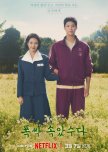
This review may contain spoilers
A Magnificent Epic: Love, Sacrifice, and Resilience Across Six Decades of South Korean History
This drama did not simply unfold before me - it reached out, took my hand, and walked me through the quiet poetry of life. It arrived like a whisper at the perfect moment, as if it had been waiting for me, knowing I needed it before I even did. And now, as I step away, I do so with a heart that sees more clearly, that loves more deeply - my parents, my brother, the family I have yet to meet. Love that had always been there, yet somehow feels more vivid now, more profoundly alive.With every episode, I wept - not just from sorrow, but from the weight of beauty, the kind that presses against your chest and makes you ache. The drama did not seek to impress; it did not force sentimentality. Instead, it captured life in its purest form. The fire of fleeting moments that propel us forward. The warmth of love that holds you just right, wrapping itself around you like a childhood memory. The unnoticed, mundane details of everyday life - the quiet rustling of morning, the lingering gaze of a loved one, the weight of an unspoken word - all painted with such tenderness that they became luminous.
But it also held space for the shadows, for the fractures we cannot bear to touch. It did not turn away from the memories we bury, from the wounds we pretend have healed. Instead, it showed the quiet, steady courage it takes to gather the pieces, to look back, to remember. And in that remembering, to choose - again and again - to keep living.
Never has a story felt so natural, so unassumingly profound, as if I had simply been invited to walk through life itself, to feel it fully. And as I reached the final moments, I cried - not just for what was lost, not just for what was found, but for the sheer, breathtaking experience of being alive.
To the writer who wove such delicate truths into a story, to the director and cinematographers who made every frame an embrace, and to the actors who did not merely perform but became - thank you. IU and Park Bo Gum shone as always, but every single soul in this drama - the parents, the grandparents, the brother, the sister-in-law, the rival father-in-law, the ex-boyfriend, the children - etched themselves into my heart.
I will return to this drama not just as a viewer, but as someone who now understands. Again and again, whenever I need to remember love. Whenever I need to remember life.
"THANK YOU FOR YOUR HARD WORK"
________________________________________________
##REVIEW OF EACH VOLUME:
-> VOLUME 1: "More than a romance"
It's a deeply moving story of love, sacrifice, and perseverance set against the rugged beauty of Jeju Island.
At its heart is Ae-sun, a young woman who dreams of becoming a poet despite the constraints of her time, and Gwan-sik, the steadfast fishmonger’s son who remains by her side through every hardship.
Moments of intense emotion punctuate the narrative, with Ae-sun’s spontaneous, impassioned dashes becoming a powerful motif. One particularly striking scene shows her sprinting down a rain-soaked pier, eyes locked on a departing ferry, her tears mingling with the downpour - an image that lingers long after the episode ends.
Beyond the central love story, the drama is enriched by a compelling ensemble cast, each character adding depth to the world they inhabit. The performances are outstanding, which brings an authenticity that makes every joy and sorrow feel tangible.
The show also explores the struggles of women in a rapidly changing society, particularly through Ae-sun’s mother, a haenyeo diver whose tough exterior hides an unyielding love for her daughter. The theme of generational sacrifice resonates deeply, highlighting the quiet, often unrecognized burdens parents bear for their children.
Rather than relying on grand spectacle, *When Life Gives You Tangerines* finds power in intimate moments and richly drawn characters. With breathtaking cinematography, an outstanding ensemble cast, and an emotionally resonant story, this drama is a beautifully woven tale that lingers long after the final scene.
-> VOLUME 2: "It takes a village to raise a child"
It's a powerful and deeply emotional story of love, loss, and resilience that strikes at the heart of what it means to be a parent. At its core are Gwan-Sik and Ae-sun, a couple bound by unwavering devotion, navigating the harsh realities of life as they strive to build a better future for their children.
In one particularly devastating sequence, their grief unfolds in quiet agony as they mourn the loss of their child. The heartbreak is palpable, yet what lingers most is the moment they face their surviving children - and realize the children blame themselves. The weight of unspoken guilt, met with the parents' tender reassurance, makes this scene impossible to forget.
Yet even in their darkest moments, Gwan-Sik and Ae-sun press on. Burdened by sorrow but driven by love, they gather their strength to continue, understanding that life doesn’t pause for grief - it demands you carry it with you and keep moving forward.
The drama’s emotional core expands as Gwan-Sik and Ae-sun wrestle with another challenge: giving their children better opportunities. Their determination to secure a brighter future reveals the sacrifices parents quietly make - yet it also shows how these efforts can sometimes leave children feeling isolated or burdened, no matter how well-intentioned.
What truly elevates these episodes is the warmth of the community that surrounds them. The saying “It takes a village to raise a child” comes to life in scenes where the village mourn together, uplift one another, and remind us of a time when bonds between people were stronger and simpler. This rich sense of connection offers comfort in the midst of heartache - a reminder that no family carries its burdens alone.
With deeply moving performances and moments that cut straight to the core, these episodes capture the raw truth of parenthood - that love isn’t just about giving, but enduring, even when the weight feels unbearable. Through it all, Gwan-Sik and Ae-sun’s quiet strength reveals that no matter how fierce the storm, love - steady, stubborn, and unrelenting - is what keeps a family standing.
->VOLUME 3: "Some goodbyes come too soon"
It’s a season of heartbreak and healing, of love lost and love that endures. The characters are forced to reckon with the weight of their choices, the passage of time, and the painful reality that not all stories have happy endings.
At the heart of this volume is Geum-myeong, who faces the painful conclusion of her relationship with Yeong-beom. Yeong-beom, bound by family expectations, cannot stand beside her the way she deserves. And so, Geum-myeong walks away - not because she stops loving him, but because she chooses herself. In a moment that lingers long after the credits roll, she returns home, where the sea and the salt air, and the unwavering love of her parents, begin to piece her back together.
But not all goodbyes are chosen. The loss of the eldest Haenyeo leaves a void in the village, a reminder that even the strongest among them cannot outrun time. Ae-sun, always the pillar of strength, finally allows herself to grieve the child she lost so long ago, finding unexpected solace in the fading memory of her grandmother. And just as one cycle ends, another begins - Eun-myeong returns from the military, only to reveal news that upends everything.
These episodes remind us that life is made up of departures and reunions, and that some goodbyes come too soon while others arrive just when they’re needed.
-> VOLUME 4: "A Bittersweet Farewell to a Timeless Masterpiece"
As When Life Gives You Tangerines comes to an end, it leaves us with a mix of warmth and sorrow. This beautifully woven story of love, resilience, and family struggles has resonated deeply, making its farewell all the more bittersweet.
The final episodes bring both closure and heartbreak. Geum-myeong finds love again with Park Cheong-seop, but the 1997 IMF crisis threatens the Yang family’s stability. Eun-myeong’s imprisonment forces Gwan-sik and Ae-sun into desperate measures, leading Gwan-sik to take a risky gamble on a failing restaurant. Just as the family starts rebuilding, tragedy strikes - Gwan-sik is diagnosed with cancer. In a gut-wrenching farewell, he passes away in Ae-sun’s arms, leaving behind a legacy of love.
Despite the pain, life moves forward. Ae-sun finds solace in poetry, and the family carries on, honoring Gwan-sik’s memory. With stunning performances, breathtaking cinematography, and a story that captures life’s hardships and beauty, When Life Gives You Tangerines is a masterpiece that will be cherished for years to come.
ONLY CRITICISM:
Netflix subtitles were very bland. I'm Korean, and the dialogues are much more heartfelt and poetic.
For timeline reference, check out the 'Discussion' section.
Was this review helpful to you?

This review may contain spoilers
A BEAUTIFULLY WOVEN ENEMIES-TO-LOVERS BL
Revenged Love takes one of the most well-worn romance premises of revenge turning into something far more complicated, and executes it with a rare combination of emotional authenticity, strong pacing, and undeniable chemistry.What begins as a calculated plot of payback between Wu Suo Wei (Zi Yu) and Chi Cheng (Tian Xuning) slowly peels away layers of pride, hurt, and misjudgment, revealing the messy vulnerability beneath. Yes, the story hits some familiar beats, but the execution elevates it. The tension isn’t just romantic; it’s steeped in class differences and old wounds that make every interaction feel charged.
The acting is the real hook here. Zi Yu gives Wu Suowei a stubborn resilience that makes his softer moments land like a gut punch. Tian Xuning’s Chi Cheng balances arrogance with a surprising depth of care, creating a push-pull dynamic that’s magnetic. Together, their chemistry is so natural it makes even the smallest gestures carry weight.
The soundtrack complements rather than overwhelms, letting key moments breathe. While there are a couple of mid-series pacing dips and predictable turns, they never derail the emotional momentum.
IN MORE DETAILS:
I must confess, as one who had never before ventured into the realm of BL drama, my initial encounter with Revenged Love was rather like stumbling upon an unexpected treasure in a crowded marketplace. I anticipated little more than a fleeting diversion, yet what unfurled before me was a tapestry woven with threads of absurd comedy, magnetic romance, outlandish subplots, and moments of such heartfelt sincerity that they warmed the very cockles of my heart.
The story commences with Wu Suo Wei (Wei Wei), a young man freshly cast aside by his girlfriend for a wealthier man, only to discover that this new beau, Chi Cheng, himself harbors a secret paramour. Rather than retreating with dignity, Wei Wei embarks on a scheme so delightfully petty it could only be born of a wounded heart: to seduce Chi Cheng as a means of exacting revenge. Alas, Wei Wei is no Casanova. His attempts at seduction are gloriously inept, transparent as glass, and prone to spectacular misfires. Watching him plot is akin to observing a man endeavor to juggle wet noodles, one cannot help but marvel at his dogged persistence despite his evident lack of finesse.
Chi Cheng, oh, he is the very archetype of the ruinous romantic hero, the sort who sets pulses racing in the finest of romcoms. Rich, impossibly handsome, with a serpentine streak that could charm the birds from the trees, he is portrayed by Tian Xu Ning with a delectable blend of cool arrogance and sudden, almost primal tenderness. One moment, he flirts as though it were an Olympic sport; the next, he lays bare a vulnerability that catches the breath. He is the scoundrel whose misdeeds somehow dazzle, yet beneath the glamour lies a character of profound complexity.
The comedic pulse of the series, for me, was Dr. Jiang Xiao Shuai, Wei Wei’s flamboyant confidant and self-appointed “gay godmother.” Liu Xuan Cheng imbues him with a mischievous charm that buoys the narrative like a lifeboat in a storm. Xiao Shuai’s brazen confidence and unabashed adoration of Chi Cheng deliver moments of pure, unadulterated joy; part mentor, part provocateur, his scenes with Guo Cheng Yu, played with shameless verve by Zhan Xuan, form a secondary romance that is both tender and delightfully slow-burning. Their dynamic is a counterpoint to the main plot’s absurdity, offering a warmth that grounds the wilder antics.
And then, there are the snakes. Good heavens, the snakes! At first, they seem a preposterous jest: Chi Cheng’s peculiar obsession with his reptilian charges, his father’s theft of them to bend him to corporate will, the ludicrous spectacle of televised snake fights as displays of machismo. Yet, these creatures slither into the narrative as a potent symbol of control, legacy, and the dangerous things we cradle as kin. The show transforms this reptilian melodrama into a source of both hilarity and genuine emotional weight. Scenes of men squabbling over crates of serpents, hiring ruffians to pilfer them, or staging impromptu “snake rescues” are absurd in the grandest sense, yet they propel the story and its relationships with surprising gravitas.
What tethered me to the screen was the evolution of Wei Wei and Chi Cheng’s relationship, from a vengeful lark to a romance that is gloriously, messily real. Wei Wei’s early “gay panic” is played for laughs, but it matures into a journey of confusion, tenderness, and, ultimately, devotion. There are moments of comedic brilliance: his indignant outburst about not wishing to be “topped” is nothing short of iconic, yet these give way to quieter scenes where he watches Chi Cheng battle for his snakes and realizes his heart has been ensnared. The transition is not without its flaws, but it is rendered with an emotional honesty that feels hard-won, the characters remaining true to their essence without succumbing to contrived epiphanies.
Chi Cheng, for all his swagger, is the revelation. He is no mere rake; his ferocity blossoms into love. He spars, boasts, and bristles, yet he shatters for Wei Wei in ways that are quietly devastating: slaying a snake to save him, standing steadfast when it matters most, enduring humiliation to shield his beloved. These are the moments that form the beating heart of Revenged Love: a core of tenderness wrapped in the trappings of absurdity.
The series revels in its comedic veins, from the farcical art-business venture Wei Wei and Chi Cheng concoct to their riotous attempts to thwart the “gold-digging” ex. The recurring “third-wheel” gag: Chi Cheng interrupting Cheng Yu and Xiao Shuai, only for Wei Wei to later assume the role of awkward interloper, is a small but perfect mirror, a comforting thread woven through the narrative’s chaos.
Yet Revenged Love does not shy from melodrama, and it wields it with largely triumphant results. The illness of Wei Wei’s mother, Li Ya, who conceals her pancreatic cancer to spare her son, is a blow to the heart. Chi Cheng’s secret caregiving unveils a raw, human fear, and Zi Yu carries these scenes with a vulnerability that tugs at the soul. Li Ya’s passing is handled with a sincerity that anchors the show’s sillier moments, lending it an unexpected tenderness.
The middle episodes, with their jealousies and misunderstandings, are the classic fuel of love stories. The return of Wang Shuo, the volatile ex, stirs delicious paranoia, granting the actors scenes of palpable dramatic tension: slamming doors, bitter accusations, and awkward confrontations that scrape against the show’s comedic sheen. Liu Jun’s Wang Shuo is infuriatingly charismatic, a believable catalyst for the leads’ insecurities.
The embezzlement-to-prison arc is, admittedly, the narrative’s weak link. The legal timeline is murky, and the pacing falters, suggesting scenes may have been cut or reordered. Yet even here, the emotional stakes hold firm. Wei Wei’s transformation from petty schemer to courageous partner is the arc’s redemption. His resolve to clear Chi Cheng’s name, to undertake the humbling, arduous work of fighting for love, is the payoff I hadn’t known I craved. His willingness to risk all for his beloved is the series’ finest testament to the romance’s depth.
The performances are a triumph of chemistry. Zi Yu’s Wei Wei evolves from frantic plotter to devoted partner with an arc that feels earned, never losing the humor and vulnerability that define him. Tian Xu Ning’s Chi Cheng is a magnetic force, commanding the screen even in moments of limited presence. The supporting cast of Liu Xuan Cheng’s Xiao Shuai, Zhan Xuan’s Cheng Yu, Liu Jun’s Wang Shuo, and others, lend texture, levity, and surprising emotional heft. Occasional dubbing mismatches and editing quirks are minor quibbles, for the actors’ commitment carries the day.
The conclusion is warm and neat: a family reconciliation, Chi Cheng’s mother embracing Wei Wei, and unambiguous joy for both couples. The brisk pace ensures a smooth, satisfying close, and while the earlier passion between Chi Cheng and Wei Wei softens, it feels a gentle, heartfelt coda to their journey.
The final image of Chi Cheng and Wei Wei in his childhood home, entwined and smiling feels a just reward after the whirlwind of schemes, snake-related absurdity, third-wheel antics, and scandal. As my first foray into BL drama, I was astonished by the depth of my connection to these characters and their love story.
I came for a tale of petty vengeance and stayed for the riotous absurdity, the unforeseen emotional depths, and the rare joy of seeing two love stories land in a place of genuine, hard-fought happiness. When the credits rolled, I found myself longing to begin anew, to relive the wild, wonderful ride.
~Thank you for reading!~
Was this review helpful to you?
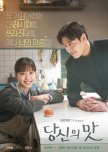
This review may contain spoilers
Starts Off Delicious, Then Overcooks the Drama
Tastefully Yours kicks off on solid ground, introducing a compelling opposites-attract dynamic between its two leads. Beom-woo, a sharp-edged corporate shark, and Yeon-joo, a sincere and grounded chef, are as different as they come. Their clash and eventual chemistry form the emotional heart of the story.Thematically, the show sets up a solid foundation. Yeon-joo’s reverence for food, sustainability, and community adds depth to what could easily be a typical "girl with a dream" storyline. Beom-woo’s journey from privileged arrogance to humbled self-awareness is predictable but still emotionally satisfying in parts. However, the rest of the plot often drags.
The food scenes are probably the best part: the traditional cooking, the contests, and the found-family vibe at Jungjae bring some genuine warmth and authenticity. That said, the rest of the plot often drags or feels rushed, especially the Japan storyline. It’s cluttered with pointless drama that adds nothing, like the love triangle with Yeon-joo’s ex, Min. That subplot is weak, feels shoehorned in, and actually undermines Yeon-joo’s character by turning her into a passive figure caught between two men.
The corporate sabotage and power plays get ridiculous at times, with predictable twists and thinly explained actions. Min’s “redemption” is unconvincing, and the repeated attempts to force drama around stolen recipes and arson stretch credibility. The pacing is uneven, where some episodes feel cluttered, while others rush through important developments.
In the end, Tastefully Yours is a cozy rom-com meal, but one that eventually overindulges in side dishes. Its first half is brisk, sweet, and full of flavor, but the second half meanders.
Still, there’s no denying the aesthetic appeal. The food sequences are beautifully shot, almost distractingly so. The visual language of food and care is a strength that the drama returns to again and again.
Was this review helpful to you?
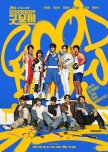
This review may contain spoilers
WHEN GREAT ACTORS ARE TRAPPED IN BAD WRITING
Wow. What a show. Truly groundbreaking stuff, if what you’re aiming for is wasting an incredible cast on a script that makes zero sense.Let’s start with the medical storyline, because clearly, accuracy wasn’t a priority. Punch-drunk syndrome? A terminal, degenerative condition? Apparently not here! Nope, here it’s just: “I’ll be fine if I take my meds.” Oh sure, buddy. No tremors, no vision loss, no slow, painful decline. Just pop a pill and you’re good to go. Groundbreaking medical science, right?
And Dong-ju. Man survives drugging, beatings, back injuries, PTSD, and a terminal brain disorder without even breaking a sweat. Superhuman? Apparently. Consequences? Never heard of them.
The romance? Oh, don’t worry, it’s definitely there… if you enjoy watching a female lead act like she just wants attention instead of, you know, having real feelings. Kim So Hyun tried, bless her, but even she couldn’t save a character written this badly. And of course, we traded a potentially amazing bromance for this half-baked love story. Great decision, writers. Really.
Now onto Ju-yeong, our so-called villain. The man who kills people for simply annoying him... except, of course, for Dong-ju, the walking definition of “please kill me already.” Because logic is optional here. For a start, what villain threatens to kill you every other scene and still doesn’t pull the trigger? Ju-yeong had everything: control over people, the money, the containers to make bodies vanish. He could’ve sneezed in Dong-ju’s direction and won. But no, he was written like a plot puppet. That first bathroom scene was pure villain gold. Everything after was downhill at record speed.
And don’t even get me started on Heo Sung-tae. THE Heo Sung-tae, reduced to a childish, weak chief for cheap laughs. Because nothing says “thriller” like forced slapstick.
The police team? Oh, please. Elite force? More like the department everyone laughs at. They were incompetent, constantly wrong, and then magically promoted at the end… for reasons? Sure. Why not. Meanwhile, this same team bends over backward defending Dong-ju, even though his idea of police work is punching people first and thinking never. But apparently, “it’s not his fault.” No, actually, it is.
And don’t think I forgot the wasted poetic justice. Ju-yeong should’ve died by his own philosophy: “loose ends need to be tied up, so now you’re the loose end.” But nope. He died unrepentant, evil to his last breath, with no real reckoning. What a waste.
So yes. If you’re looking for a story where good actors are forced to play idiots, medical science doesn’t exist, and logic is an urban legend, this is the show for you.
At least Jong-hyun’s jealous bromance moments were fun. That’s… something, I guess.
Was this review helpful to you?

A Charming, Nostalgic Romcom with Heart
Love Untangled is a delightful romantic comedy that captures the awkward, hopeful essence of teenage love in 1998 Busan. The story follows Park Se-ri, a high schooler who believes straightening her curly hair will win the heart of her crush, Kim Hyun. Enter Han Yun-seok, a kind-hearted transfer student, and Se-ri’s journey shifts from chasing approval to embracing her true self.The film’s biggest strength is Shin Eun-soo’s magnetic performance as Se-ri. She brings infectious energy and relatability, making every moment of self-doubt and triumph feel authentic. Gong Myung’s Yun-seok is equally endearing, his quiet vulnerability balancing Se-ri’s vibrancy, though their chemistry sometimes feels gentle rather than electric. The nostalgic 90s setting, complete with pagers, retro bikes, and a sunny Busan backdrop, creates a warm, wistful vibe that’s hard to resist. Cameos by familiar faces add a playful touch, and the soundtrack’s catchy '90s tunes amplify the charm.
The “love yourself” message, tied to Se-ri’s curly hair, is refreshing and avoids cliché beauty-makeover tropes. However, the nearly two-hour runtime drags in the middle, and the story leans heavily on familiar romcom beats: the love triangle, the misunderstanding, the tidy resolution. A subplot about domestic violence adds emotional weight but feels rushed, leaving some depth unexplored. Supporting characters, like Se-ri’s twin sister, could’ve been fleshed out to enrich the story.
At its core, Love Untangled is a feel-good escape that doesn’t reinvent the genre but doesn’t need to. It’s sweet, sincere, and perfect for anyone craving a lighthearted teen romance with a side of nostalgia.
Was this review helpful to you?
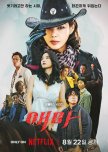
ONCE UPON A TIME IN CHUNGMURO
Madame Aema (1982) is a landmark in South Korean cinema. Released during Chun Doo-hwan’s authoritarian “3S Policy” era (Sports, Screen, Sex), it boldly tested the limits of censorship while becoming a commercial hit.Set in early 1980s Korea, “Aema” follows a seasoned star and an ambitious newcomer as they navigate clashes with a misogynistic producer and the strict censorship of the time while making Madame Aema, Korea’s first erotic film.
At the center is veteran actress Jung Hui-ran, desperate to escape her image as a sex symbol but pressured by producer Koo Jung-ho to star in the film. Director Kwak In-u hopes to craft a subtler, erotic arthouse work, while newcomer Sin Ju-ae is willing to risk everything to achieve fame. Hui-ran initially resents Ju-ae, but over time, the two women come to understand that the real adversary is the patriarchal hierarchy of the film industry itself.
The relationship between Hui-ran and Ju-ae is not only an undeniable point of interest but also a symbolic core of the narrative: two women influencing and transforming each other in ways that ripple beyond their own survival.
The story emphasizes female solidarity, using sexual desire as a metaphor for the yearning for autonomy and agency.
At its core, Aema thrives on collisions between star power and censorship, artistry and exploitation, and repression and liberation.
Visually, the film bursts with vibrant colors and flamboyant fashion, creating a sharp contrast to the oppressive political climate. Beneath its surface, it explores the hidden struggles of women forced to mask their pain in a male-dominated society.
Although the series sometimes veers into caricature, its fearless style and dynamic portrayal of the 1980s Korean film world anchor it as both a time capsule and a provocative commentary on its era. The spectacle is entertaining, but it’s the undercurrents, with the struggles of women navigating desire, power, and constraint, that give it lasting weight.
In essence, “Aema” is not just about the making of an erotic film; it’s about the making of female agency under siege. It reminds us that behind the glitter and scandal lies a story of survival, solidarity, and resistance, one that continues to echo in conversations about gender, censorship, and the politics of representation today.
Was this review helpful to you?
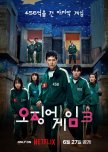
This review may contain spoilers
A FINALE AS HOLLOW AS THE VIPs’ ACTING SKILLS
**Disclaimer: This final review reflects my personal opinion after a second viewing.**Alright, I just tore through Squid Game Season 3, twice, and holy hell, it’s a wild, messy ride that had me hooked but also pissed off at times. This season claws its way back to Season 1’s brutal magic in the first half, betrayals that made me want to throw my remote, and characters I couldn’t stop obsessing over. But many parts straight-up fumbled, and I’m not here to pretend they didn’t.
Gi-hun’s still the heart of this thing, and his relentless fight to burn the game down had me rooting for him, even when it felt like he was slamming his head against a wall. Myung-gi, though? Man, he drove me nuts. No-eul was a badass, though. Her rogue mission and that insane office showdown? I was screaming when she saved Kyung-suk, finally showing her true grit. Jun-ho’s arc got some redemption after Season 2’s aimless mess, but it still felt like he was just flailing against untouchable billionaires. And the Frontman? Dude’s a snake, but a compelling one. His mix of sincerity and backstabbing kept me glued, even if I don’t trust him for a second.
The games hit like a truck: bloody, chaotic, and packed with Season 1 vibes like the marble game and hopscotch. The betrayals stung hard, especially when allies turned on each other like it was nothing. But to be honest, some deaths, like Jun-hee’s, barely made me blink compared to Hyun-ju’s or Geum-ja’s. It made Gi-hun and Myung-gi’s survival feel too predictable, like the writers were scared to go all-in.
The big problem? This season swings for the fences with Gi-hun, Jun-ho, and Woo-seok trying to topple this shadowy corporation, but it’s a lost cause from the jump. Season 1 worked because it was raw: survive, win, get out. Done. This dystopian Hunger Games wannabe vibe is cool in theory, but it’s too big for its own good. The whole “greed always wins” message? Yeah, I get it, but it left me hollow, like the show was just shrugging at its own stakes. And don’t get me started on the VIPs’ acting... cartoonish and stiff, it yanked me out of the story every time they opened their mouths.
It’s a bloody, thrilling mess that recaptures some of the old spark, but it trips over its own ambition and leaves you wishing for a tighter punch.
WHAT I DISLIKED:
• VIPs remain the weakest part of this show. Their acting is wooden, and their presence is cartoonish in a story that otherwise demands gravity.
• Characters like Players 203, 039, and 100, who made it so far in the games, are vivid but lack depth. Their archetypes were one-dimensional.
• While the death-game format still delivers high-stakes tension, I did feel the interpersonal dynamics falter this time. With fewer players remaining, that complex web of social and strategic interplay, the thing that gave previous seasons their gripping unpredictability, is significantly reduced.
• Jun-ho and Woo-seok’s investigation felt like an afterthought. Key moments, like Jun-ho harpooning Captain Park or Woo-seok’s jail stint, were rushed and poorly integrated with the island’s narrative, diluting their impact and making the outside world feel like a side note.
• The season continues the voting mechanic from last time and still aims to reflect modern ideological divides, but honestly, the metaphor feels dulled now. The outcomes were predictable, and the tension that once surrounded each vote has faded.
• The middle of the season sagged under the weight of repetitive character conflicts. Moments of quiet character development, like Geum-ja’s confession to Gi-hun, were often overshadowed by drawn-out brutality, disrupting the narrative flow.
• Unlike Season 1’s rich player dynamics, Season 3’s survivors rarely formed meaningful connections. The “Bathroom Team” (Hyun-ju, Geum-ja, Jun-hee) was a brief exception, but most interactions were transactional or hostile, making it harder to care about the group’s fate.
• The final scene introducing a new recruiter in LA came off as a blatant setup for a spin-off or sequel season. It felt tacked-on and cheap, undermining the emotional closure of the island’s destruction and Gi-hun’s sacrifice.
WHAT I LIKED:
• Gi-hun’s arc is the beating heart of the season. Watching him evolve from a broken, mute shell to a man who finds purpose in protecting Jun-hee’s baby is profoundly moving. His refusal to take the Front Man’s deal made me emotional. It’s a testament to his unshakable humanity, even when the world around him collapses into chaos.
• Jang Geum-ja completely wrecked me in a midseason scene that was both haunting and transcendent. Her dynamic with her son, Yong-sik, became one of the emotional cores of the season. I also appreciated how characters like Jun-hee and Hyun-ju gained complexity and rose to the top, offering some of the best scenes of the season and stepping up when Gi-hun has lost all hope.
• No-eul’s rogue mission is a standout. Her transformation from a conflicted pink soldier to a vigilante fighting for redemption is thrilling and emotionally complex. The office showdown had me cheering. Her choice to live, inspired by Gi-hun’s sacrifice, gave me hope that even the most broken can find purpose.
• Jung Jae-il’s score continues to haunt me, and the surreal, almost nightmarish production design makes even familiar game settings feel disorienting.
• Sae-byeok’s family reunion, No-eul’s flight to her child, and Jun-ho’s custody of the baby in the epilogue felt hopeful.
Was this review helpful to you?
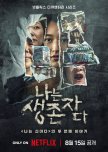
The Echoes of Survivors: Inside Korea’s Tragedies
42 people found this review helpful
This review may contain spoilers
I didn’t know if I had the capacity to sit through this. Not because I didn’t want to, but because I was afraid of what it would do to me. Afraid of the weight of it, of carrying it with me after the credits rolled.But here’s the thing: once it began, I couldn’t look away. And I'm still shaking.
The word “survivor” has never felt so complicated. They didn’t just “make it out.” They clawed their way out. They stitched themselves together in rooms built to destroy them. And surviving didn’t mean it ended. It meant beginning a second life, one that society rarely has space for, one that the rest of us would rather not look at because it makes us uncomfortable.
The stories ripple through decades of Korean history:
Brothers Welfare Center first. I swear, this one made my blood boil. They grabbed people off the streets for being poor. Kids. Adults. Anybody. Locked them up in a “welfare center” that was just torture in disguise. People starved, abused, disappeared. Survivors are elderly now, their lives permanently bent around this one horror, and they still haven’t even gotten a real apology. Like… are you kidding me? Watching them speak, I felt ashamed to live in a country that let this happen and then buried it under silence. It wasn’t long ago. It was here, on this same soil I stand on.
Then JMS. And okay, hearing Maple again? I wanted to throw my laptop across the room. She is tired. You can see it. She gave her entire youth to a cult that stole her body, stole her time, stole her voice. And she’s still fighting. Still carrying this. Meanwhile, JMS is still operating. People are still defending him. And I’m like: how many women have to stand up bleeding before we finally say, enough?
But Jijonpa… I wasn’t okay after that. I don’t think anyone could be. A literal “murder factory.” The only survivor describing nine days in that hell; nine days of obeying, cooking, clinging to whatever shred of hope they dangled in front of her. She begged not to be cut into pieces. That was her prayer. Do you understand how broken you have to be to beg for that? How do you listen to a sentence like that and not feel your soul rearrange itself?
And then Sampoong. A department store, like… people were just shopping, working, living. And in seconds, gone. 502 dead. Thousands crushed or buried alive because some men wanted to save money on concrete. Survivors crawl out, but they never leave. They’re still down there. Their bodies walked out, but their souls are buried under the rubble. You can hear it in their voices. They’re still trapped.
I think what shook me most wasn’t just the horror of what happened; it was how familiar the silence around it felt. The forgetting. The way people moved on. The way entire systems turned their backs. Survivors didn’t just have to survive then; they’re still surviving now.
Critique:
Sorry, but the producers? They get a fat zero from me. Because why do you think it’s okay to shove them back into the exact cages they barely crawled out of? Dressing survivors in jumpsuits, tying ropes around their wrists, reconstructing cells, like trauma cosplay? That’s exploitation dressed up as “immersion.”
Their voices alone are enough. Their memories are enough. The tremble in their hands, the cracks in their voices, the weight in their eyes, that tells me everything I need to know. You don’t need to retraumatize them. You don’t need to manufacture “shock value” when the truth is already unbearable. And honestly, it makes me sick that the same system that silenced them for decades is now packaging their pain for viewership points. Survivors aren’t props. Their suffering isn’t a set design.
Final thoughts:
I don’t know how you’re supposed to “wrap up” after something like this. There isn’t a neat bow you can tie on four different hells. It’s ugly. It’s exhausting. It’s waking up every day with scars people can’t see and realizing the world would rather you stay quiet about them.
And yet… they spoke. They sat in front of cameras and dragged these memories out of their bones so we wouldn’t forget. That’s not just bravery, that’s sacrifice. Because every time they tell it, they have to relive it.
Which is why the production choices bothered me so much. Survivors don’t need ropes or cells or costumes to “set the scene.” They are the scene. Their words, their tremors, their pauses... that’s enough. Honestly, more than enough. And I can’t shake the feeling that forcing them through those re-creations was like retraumatizing them for the sake of aesthetics.
If it weren’t for that, this would’ve been a perfect 10 for me. No hesitation. But because of those choices, I have to knock it down to an 8. And that sucks, because the survivors gave us everything. They deserve nothing less than perfection in how their stories are told.
So maybe the only real final thought is this: don’t look away. Sit with it. Let it haunt you. Because the survivors don’t get to walk away when the credits roll, and neither should we.
Was this review helpful to you?

A MEMORABLE MELODRAMA
Our Movie isn’t a love story that wraps you in comfort; it’s the kind that tears you apart quietly, piece by piece, until you’re caught between hope and fear, unsure why you’re still holding on. Watching Our Movie felt like standing in a hospital room, afraid to breathe too loud, afraid my emotions would spill over and break everything. Yet, it’s one of the most beautiful things I’ve ever seen. A raw, poetic exploration of love, loss, and what it means to be human when time is slipping away.General commentary:
The story follows Lee Je Ha, a director suffocating under his father’s legacy, and Lee Da Eum, an actress counting down her final months due to a terminal illness. Their romance doesn’t start with fireworks; it feels like two broken people standing in the same storm, reaching for each other because no one else understands. Namgoong Min’s performance as Je Ha wrecked me. His guilt, his fear of wanting something doomed, was etched into every glance, every hesitation. There were moments I wanted to shake him, to scream, “Just take her love before it’s gone!” But I got why he held back, loving someone when you know you’ll lose them is terrifying. Jeon Yeo-been as Da Eum is sunlight tangled with fear. Her handycam, capturing fleeting moments, isn’t just about art; it’s her proof of existence, her laughter, her love. One scene, where she questions if she even has the right to fall in love, stayed with me for days. I’ve felt that too, because sometimes loving feels like asking too much.
The visuals in Our Movie are a masterpiece. Every frame is like a painting, with soft lighting and nostalgic home-camera shots that made me feel like I was inside their memories. The use of a cinemascope ratio in key scenes was a brilliant nod to the drama’s meta-narrative: a story about making a film within a film. It’s a love letter to cinema, reflecting how art can heal and connect. The OST wove through it all, with haunting melodies that amplified every quiet heartbreak and fleeting joy. The cinematography doesn’t just show the story; it makes you feel the weight of time, the beauty of a glance, the ache of an almost-touch.
It doesn’t shy away from pain but never drowns in it. Instead, it balances despair with a quiet, defiant hope. Da Eum’s mantra, that life, no matter how short, is worth living, hit me hard. It made me want to step outside, breathe deeply, and watch the sunset, to live every moment fully. The ending, bittersweet and unflinching, broke me but also lifted me. It showed life moving forward, carrying grief but not defined by it.
Our Movie is a mirror to what it means to love when time is the enemy. The real villain here isn’t illness or fate... it’s time itself. Da Eum is stealing it, Je Ha is trying to freeze it, but no one wins. Yet, every moment between them feels sharp, precious, worth every second of pain. This show doesn’t promise a happy ending or try to comfort you. It just sits with you, raw and real, and that’s what makes it beautiful. It reminded me that love, even when it breaks you, is worth it.
FAVOURITE QUOTES:
“𝘐’𝘮 𝘯𝘰𝘵 𝘪𝘯𝘵𝘦𝘳𝘦𝘴𝘵𝘦𝘥 𝘪𝘯 𝘨𝘰𝘪𝘯𝘨 𝘩𝘦𝘢𝘥-𝘰𝘯. 𝘐 𝘸𝘢𝘯𝘵 𝘵𝘰 𝘮𝘢𝘬𝘦 𝘴𝘰𝘮𝘦𝘵𝘩𝘪𝘯𝘨 𝘵𝘩𝘢𝘵’𝘴 𝘮𝘪𝘯𝘦, 𝘪𝘯 𝘮𝘺 𝘰𝘸𝘯 𝘯𝘢𝘮𝘦.”
“𝘌𝘷𝘦𝘳𝘺 𝘴𝘦𝘤𝘰𝘯𝘥 𝘰𝘧 𝘦𝘷𝘦𝘳𝘺 𝘮𝘪𝘯𝘶𝘵𝘦 𝘪𝘴 𝘴𝘰 𝘱𝘳𝘦𝘤𝘪𝘰𝘶𝘴 𝘢𝘯𝘥 𝘴𝘰 𝘷𝘢𝘭𝘶𝘢𝘣𝘭𝘦 𝘵𝘰 𝘮𝘦 𝘵𝘩𝘢𝘵 𝘵𝘩𝘦𝘺’𝘳𝘦 𝘢𝘭𝘭 𝘮𝘢𝘴𝘵𝘦𝘳𝘱𝘪𝘦𝘤𝘦𝘴. 𝘈𝘭𝘭 𝘵𝘩𝘦 𝘮𝘰𝘮𝘦𝘯𝘵𝘴 𝘺𝘰𝘶 𝘫𝘶𝘴𝘵 𝘭𝘦𝘵 𝘴𝘭𝘪𝘱 𝘢𝘸𝘢𝘺 𝘢𝘳𝘦 𝘭𝘪𝘬𝘦 𝘳𝘰𝘮𝘢𝘯𝘤𝘦 𝘰𝘳 𝘧𝘢𝘯𝘵𝘢𝘴𝘺 𝘧𝘪𝘭𝘮𝘴 𝘵𝘰 𝘮𝘦. 𝘉𝘶𝘵 𝘺𝘰𝘶’𝘭𝘭 𝘬𝘦𝘦𝘱 𝘰𝘯 𝘭𝘪𝘷𝘪𝘯𝘨 𝘸𝘪𝘵𝘩𝘰𝘶𝘵 𝘬𝘯𝘰𝘸𝘪𝘯𝘨 𝘵𝘩𝘢𝘵.”
“𝘓𝘦𝘵’𝘴 𝘧𝘰𝘳𝘨𝘦𝘵 𝘢𝘭𝘭 𝘵𝘩𝘦 𝘱𝘳𝘦𝘴𝘴𝘶𝘳𝘦 𝘧𝘰𝘳 𝘫𝘶𝘴𝘵 𝘢 𝘮𝘪𝘯𝘶𝘵𝘦. 𝘐𝘵 𝘳𝘦𝘢𝘭𝘭𝘺 𝘥𝘰𝘦𝘴 𝘧𝘦𝘦𝘭 𝘢𝘮𝘢𝘻𝘪𝘯𝘨.”
“𝘙𝘦𝘢𝘭 𝘭𝘪𝘧𝘦 𝘸𝘢𝘴 𝘢𝘭𝘸𝘢𝘺𝘴 𝘰𝘶𝘵 𝘵𝘩𝘦𝘳𝘦, 𝘣𝘦𝘺𝘰𝘯𝘥 𝘵𝘩𝘦 𝘩𝘰𝘴𝘱𝘪𝘵𝘢𝘭. 𝘛𝘩𝘦 𝘰𝘶𝘵𝘴𝘪𝘥𝘦 𝘸𝘰𝘳𝘭𝘥 𝘵𝘶𝘳𝘯𝘦𝘥 𝘰𝘶𝘵 𝘵𝘰 𝘣𝘦 𝘵𝘰𝘶𝘨𝘩𝘦𝘳 𝘵𝘩𝘢𝘯 𝘐 𝘵𝘩𝘰𝘶𝘨𝘩𝘵. 𝘉𝘶𝘵 𝘐 𝘥𝘰𝘯’𝘵 𝘸𝘢𝘯𝘵 𝘵𝘰 𝘨𝘪𝘷𝘦 𝘶𝘱.”
“𝘐’𝘮 𝘯𝘰𝘵 𝘴𝘰𝘮𝘦𝘰𝘯𝘦 𝘸𝘩𝘰 𝘦𝘹𝘪𝘴𝘵𝘴 𝘵𝘰 𝘢𝘤𝘵 𝘵𝘩𝘦 𝘸𝘢𝘺 𝘺𝘰𝘶 𝘸𝘢𝘯𝘵 𝘰𝘳 𝘱𝘳𝘦𝘥𝘪𝘤𝘵. 𝘛𝘩𝘢𝘵’𝘴 𝘴𝘰𝘮𝘦𝘵𝘩𝘪𝘯𝘨 𝘺𝘰𝘶 𝘴𝘩𝘰𝘶𝘭𝘥 𝘦𝘹𝘱𝘦𝘤𝘵 𝘧𝘳𝘰𝘮 𝘴𝘰𝘮𝘦𝘰𝘯𝘦 𝘸𝘩𝘰 𝘭𝘰𝘷𝘦𝘴 𝘺𝘰𝘶.”
“𝘌𝘷𝘦𝘳𝘺 𝘯𝘪𝘨𝘩𝘵, 𝘐 𝘣𝘦𝘨 𝘵𝘰 𝘭𝘪𝘷𝘦. 𝘈𝘯𝘥 𝘸𝘩𝘦𝘯 𝘐 𝘸𝘢𝘬𝘦 𝘶𝘱, 𝘐 𝘵𝘩𝘪𝘯𝘬, ‘𝘞𝘰𝘸, 𝘐 𝘨𝘰𝘵 𝘰𝘯𝘦 𝘮𝘰𝘳𝘦 𝘥𝘢𝘺’, ‘𝘞𝘢𝘪𝘵, 𝘯𝘰’, ‘𝘔𝘢𝘺𝘣𝘦 𝘵𝘰𝘥𝘢𝘺’𝘴 𝘵𝘩𝘦 𝘭𝘢𝘴𝘵’.”
“𝘐 𝘬𝘦𝘦𝘱 𝘧𝘰𝘳𝘨𝘦𝘵𝘵𝘪𝘯𝘨 𝘵𝘩𝘪𝘯𝘨𝘴 𝘸𝘩𝘦𝘯 𝘐’𝘮 𝘸𝘪𝘵𝘩 𝘺𝘰𝘶. 𝘠𝘰𝘶’𝘳𝘦 𝘴𝘪𝘤𝘬, 𝘣𝘶𝘵 𝘐 𝘥𝘰𝘯’𝘵 𝘴𝘦𝘦 𝘵𝘩𝘢𝘵. 𝘛𝘩𝘦𝘳𝘦’𝘴 𝘯𝘰 𝘵𝘪𝘮𝘦 𝘣𝘶𝘵 𝘪𝘧 𝘧𝘦𝘦𝘭𝘴 𝘭𝘪𝘬𝘦 𝘵𝘩𝘦𝘳𝘦 𝘪𝘴. 𝘐 𝘭𝘪𝘬𝘦 𝘺𝘰𝘶, 𝘣𝘶𝘵 𝘐 𝘧𝘦𝘦𝘭 𝘭𝘪𝘬𝘦 𝘐 𝘴𝘩𝘰𝘶𝘭𝘥𝘯’𝘵. 𝘐 𝘵𝘩𝘰𝘶𝘨𝘩𝘵 𝘐 𝘸𝘢𝘴 𝘮𝘪𝘴𝘵𝘢𝘬𝘦𝘯 𝘣𝘶𝘵 𝘐 𝘬𝘯𝘰𝘸 𝘢𝘭𝘭 𝘵𝘰𝘰 𝘸𝘦𝘭𝘭 𝘵𝘩𝘢𝘵 𝘪𝘵’𝘴 𝘳𝘦𝘢𝘭.”
FINAL THOUGHTS:
What an achingly beautiful drama this was, one that deserves far more love from those who avoided it out of fear of a tragic ending. Yes, the conclusion is bittersweet, but the emotional journey makes every tear worth it.
From day 1, I knew JYB and NGM would deliver, and they did not disappoint for even a second. Their performances were raw, layered, and so perfectly in sync that you couldn’t help but be drawn into their world.
The storytelling was breathtaking in its quietest moments. The scene where cherry blossoms drifted through the air, brushing past Daeum’s loved ones, felt like poetry in motion. And Jeha, sitting before that empty seat, his quiet breakdown shattered me completely.
But nothing hurt more than Daeum’s moments with her parents and Gyo-young. Every smile, every touch, every lingering glance carried the weight of love and impending loss. I cried until my chest ached, and yet I couldn’t look away.
And somehow, deep down, we all knew it, the very first scene of the drama would circle back to the last. When it finally did, it felt inevitable… and devastatingly perfect.
Was this review helpful to you?

This review may contain spoilers
When Bullets Fly, Logic Dies
Trigger struts in like it owns the place. It promises dystopian thrills, a deep dive into the psychology of rage, and maybe even some searing social commentary. For a moment, you believe it. Then it trips over its own shoelaces, spills coffee on the manifesto, and starts showing stylish gunfights instead.Our hero, Lee Do, is a former military sniper turned police officer who treats his taser like a baby blanket. He’s calm, empathetic, and apparently the only person in Korea with competency. When massacres break out across the country, he’s reluctantly dragged back into gunplay.
Moon Baek, the man who lights the match, who hands everyone guns not for money, but for ideology. He’s all contradictions: flashy yet tragic, smiling while your moral compass quietly vomits in the corner. His presence crackles. Every scene with him is electric.
At its best, Trigger gives you an unsettling mirror: ordinary people realizing that a gun turns them from background extras into the main characters of their own revenge films. It’s chilling, human, and horribly plausible.
Then… the plot walks into traffic.
A teenager and a middle-aged woman find a gun through a casual Naver search, but the entire police force of South Korea can’t figure it out. “Internet? Never heard of it.” It’s the kind of plot hole you could drive a tank through, slowly, so nobody gets hurt.
The script also has a strange habit of making every character around Lee Do incompetent just so he can shine brighter. It’s not clever. It’s like stacking the chessboard so your opponent only has pawns, then bragging about your strategic genius.
In the end, the show’s grand answer to systemic rage is… well… a little Hallmark. Sweet, maybe, but so emotionally oversimplified it makes you wonder if someone swapped it for a public service announcement.
So Trigger starts like a sleek bullet that is fast, dangerous, aimed with precision, and ends like a firecracker in the rain: a lot of smoke, a little noise, and the lingering smell of something that could’ve been spectacular if only it hadn’t soaked itself in style instead of substance.
Was this review helpful to you?

 26
26 37
37 4
4 2
2 2
2 4
4 5
5 4
4 7
7 1
1 3
3 3
3 1
1 2
2 1
1 3
3 1
1 2
2 1
1 1
1 1
1 3
3 10
10 2
2 5
5





















